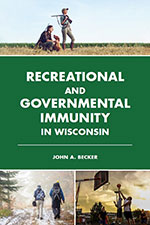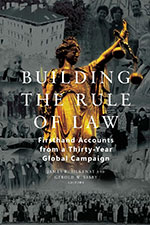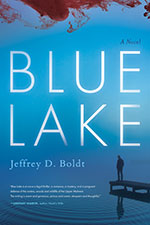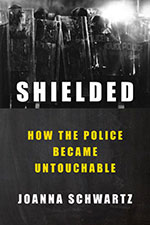 Verdict: It’s a Keeper
Verdict: It’s a Keeper
Recreational and Governmental Immunity in Wisconsin
By John A. Becker (Racine, WI: Nevin Publishing Co., 2022). 429 pgs. $99. Order, www.nevinpublishing.com.
Reviewed by Ian R. Pomplin
The contours of the various types of immunity have long vexed attorneys on all sides of a dispute. Specifically, recreational immunity has been controversial, and its application has often been inconsistent and at odds with the intention of the legislative history. This book primarily analyzes the legislative history and notable cases decided under this doctrine and does so in an accessible form aimed at lawyers who practice in personal injury law. As the book covers in great detail, the applicability of the law can often be broader than attorneys, judges, or even the drafters intended, so this may cover a wider audience than one might initially think.
To help readers understand how the doctrine has reached its current status, the author traces the history of the statute, from its “berry picking” origin in the 1960s to the modern adoption in the 1980s, all the way through case law carrying into the 2020s. This history is coherently presented with legislative material showing the original intent of the law. To further aid attorneys, the author includes a case lineage for each term of art used in the statute, which could be quite helpful when drafting legal arguments. This book is a must-have for anyone intending to litigate negligence claims arising in nature or during a recreational activity or any claim that could be argued to stem, at least in part, from a recreational activity.
The second part of this book, on governmental immunity, is slightly less useful. This portion is less aimed at lawyers attempting to sue or defend a governmental entity or employee and more aimed at aspiring judges or justices attempting to disentangle confusing governmental immunity principles.
The author primarily provides two analyses. The first is on the difference between governmental entity immunity and governmental employee immunity; this analysis is frequently muddled by the court system. The second analysis is whether the term of art “exercise of legislative, quasi-legislative, judicial or quasi-judicial function” is truly synonymous with “discretionary decision.”
These are interesting topics, but a more full analysis to help lawyers prosecute or defend lawsuits involving this immunity would bring this portion more in line with the recreational immunity chapters. Further, there are numerous legal issues and nuances that are within the concept of governmental immunity under Wis. Stat. section 893.80, and those issues should be more thoroughly discussed in a stand-alone book that directly addresses the history of that statute, its various terms of art and interpretations, and the relevant case law.
This book is a great introduction and refresher to the doctrine of recreational immunity and an interesting reconciliation of case law covering governmental immunity. I absolutely recommend this book as a reference guide for those attorneys who have a legal practice that intersects with the topics covered.
Ian Pomplin, Marquette 2019, is an assistant city attorney in Racine, primarily practicing civil litigation.
 Verdict: It’s a Keeper
Verdict: It’s a Keeper
Building the Rule of Law: Firsthand Accounts from a Thirty-Year Global Campaign
Editedby James R. Silkenat & Gerold W. Libby, with 72 contributors (Chicago, IL: ABA International Law Section, 2021). 543 pgs. $39.95. Order, www.shopaba.org.
Reviewed by Aaron E. Schindler
After the fall of the Berlin Wall in 1989, former Eastern Bloc countries hungered for the rule of law. Hundreds of U.S. legal professionals offered to assist these emerging democracies create open and accountable governments, just laws, and ethical, impartial judiciaries. Under the auspices of the American Bar Association (ABA)’s Rule of Law Initiative (ROLI), volunteers worked and lived abroad in difficult, sometimes dangerous, circumstances. This book is a collection of inspiring stories by these volunteers.
Want to Review a Book?
Please request a book and writing guidelines from the Wisconsin Lawyer managing editor at wislawmag@wisbar.org. Reviewers may keep the book reviewed. Reviews of about 500 words are due within 45 days of receiving the book. Reviews are published, space permitting, in the order received and may be edited for length and clarity.
Volunteers assisted emerging democracies in myriad ways: from writing national constitutions, to running conferences on statute writing, to designing training programs for new judges – anything and everything legal-system related. Recurring issues these volunteers encountered included bribery expectations, ethical problems, lack of property rights, lack of women’s rights, and a general lack of knowledge about how just courts operate. For example, rules of evidence are literally a foreign concept in many countries. And while many U.S. lawyers could write a passable judicial code of ethics because they’ve been steeped in the American legal tradition, the same is not so for people who grew up where judges took orders from the ruling party.
Over the past 30 years, ROLI, the “Legal Peace Corps,” has expanded to more than 100 countries worldwide. The final chapters of the book forecast the future of ROLI, a future that includes a focus on fighting corruption. I’m sure ROLI will continue to be my favorite ABA project; it is something to be proud of.
My favorite parts of the book were the personal anecdotes. An example is the story of successfully convincing the judges of the reformulated Bosnia-Herzegovina supreme court to wear robes. When the judges first walked into the courtroom in their robes, there was a gasp and then hushed silence, with tears on the faces of many. The presence of the judges in their robes represented to the assembly the country’s momentous change from the rule of humans to the rule of law.
But spreading the rule of law can be frustrating. Amid the many success stories, the Russian efforts are a notable disappointment. As Wisconsin lawyer Dianne Post chronicles, the progress she and others made in reforming Russian sex-trafficking and domestic-violence laws has largely been rolled back under Vladimir Putin. Similarly, while ROLI helped Boris Yeltsin’s Russia implement jury trials for the first time in 100 years, ROLI’s strong encouragement to remove defendant cages was futile, and the cages remain in Russian courtrooms to this day.
In summary, this book is about legal-profession heroes sharing the American experience with people emerging from totalitarian regimes. The leaders in newly democratic countries want to know how to start and run law schools, appellate courts, legal aid clinics, and so on. This book is about the Americans who responded, “Yes, I can help!” Read and be inspired and maybe you’ll find your own next adventure!
Aaron Schindler, U.W. 2023, will be joining Perkins Coie LLP in Madison and focusing on patent litigation. He was formerly an actuary and derivatives trader.
 Verdict: Touchdown!
Verdict: Touchdown!
Blue Lake
By Jeffrey D. Boldt (Austin, TX: River Grove Books, 2022). Fiction. 301 pgs. $18.95. Order, www.amazon.com.
Reviewed by Greg C. Anderson
Blue Lake is a book with a twist. Most legal thrillers focus on one courtroom. Blue Lake involves an administrative law judge (ALJ), which allows the protagonist, Jason Erickson, to vary his locations throughout Wisconsin. Erickson is an ALJ for the Wisconsin EPA. He holds hearings throughout the state, which moves the action in the novel from Madison to La Crosse to Milwaukee to Green Bay and beyond. Judge Erickson is caught up in a political battle over enforcement of the various environmental laws and the effects on Wisconsin’s environment and residents.
Ineffective bureaucrats, bribery offers, death threats, and mobsters threaten to become part of Judge Erickson’s everyday life along with his new girlfriend. However, the pacing of the novel allows the story to build in a believable manner. The characters, both good and not so good, are well developed without resorting to stereotypes. The depiction of the various Wisconsin locales is spot on.
Readers of legal thrillers should add Blue Lake to their list of “must reads.”
Greg C. Anderson, U.W. 1985, is an assistant dean at Northern Illinois University College of Law in DeKalb, Ill.
 Verdict: Touchdown!
Verdict: Touchdown!
Shielded: How the Police Became Untouchable
By Joanna Schwartz (Viking, 2023). 308 pgs. $30. Order, www.amazon.com.
Reviewed by James A. Johnson
In 1967, in Pierson v. Ray, the U.S. Supreme Court invented a new legal principle labeled qualified immunity. Pierson v. Ray was overruled in 1982 by Harlow v. Fitzgerald, which turned on an officer’s “good faith.” Qualified immunity grants immunity from civil suits to governmental officials performing discretionary functions unless the plaintiff shows that the official violated clearly established statutory or constitutional rights of which a reasonable person would have known. It limits the public’s right to sue certain governmental employees. Qualified immunity is designed to protect governmental officials from frivolous lawsuits and shields law enforcement officers from being sued for misconduct. It is a defense that has been interpreted by courts so broadly that it allows police and other law enforcement officers to engage in unconstitutional acts with impunity. In essence, it makes it perfectly legal for law enforcement officers to infringe on people’s rights.
The book Shieldedexplains how law enforcement officers are permitted to get away with it. Schwartz describes the many barriers that keep people from getting justice through the courts and also offers a path forward. Shielded consists of 13 meaningful chapters, beginning with “How We Got Here” and ending with “A Better Way.” There are detailed notes for each chapter at the end of the book.
UCLA Law Professor Joanna Schwartz explains in Shielded the complicated bevy of laws and policies that protect police officers from being sued for misconduct. She provides a definitive examination of how the legal system prevents accountability for police misconduct. Police officers do not need a warrant to search people who are walking down a street. It does not matter if the officers violated someone’s constitutional rights. For example: Tyre Nichols, George Floyd, Breonna Taylor, Alonzo Bagley, and a plethora of others.
Schwartz deftly sets out the process, policies, and case law demonstrating how the U.S. got to this point where law enforcement officers who are sworn to protect the law do not have to follow it. In this book, the product of more than two decades of research and advocacy, Schwartz exposes and provides an insightful analysis on qualified immunity, no-knock warrants, 42 U.S.C. § 1983, 42 U.S.C. § 1988, and unfair aspects of the justice system. It is jam-packed with important case law. Schwartz paints a telling picture of the human cost of the U.S.’s failing criminal justice system. She is one of the country’s leading experts on police misconduct litigation.
Schwartz’s educational background (Brown University and Yale Law School) together with her experience in private practice eminently qualify her to write Shielded. Of particular note is her ability to include a human-interest element in each case she explains. Also of note is a glossary of legal terms, from “absolute immunity” to “warrant,” explaining with clarity the meaning of 33 legal terms. Moreover, there are 38 key cases from 1896 to 2009, covering decisions from the U.S. Supreme Court and the U.S. Courts of Appeal for the Sixth, Eighth, and Ninth Circuits. Shielded engages the reader so smoothly that even people who are not lawyers can follow, appreciate, and understand.
Schwartz offers solutions for the failures of the criminal justice system. One of her ideas is to require the police to pay a portion of civil judgments. In the wake of the murders of Tyre Nichols, George Floyd, and Alonzo Bagley, Shielded is timely. The book is endorsed by some of the giants of the legal profession: Erwin Chemerinsky, dean of the University of California at Berkeley School of Law; Sherrilyn Ifill, former president and director-counsel of the NAACP Legal Defense Fund; and Kimberlé Crenshaw, a professor at the UCLA School of Law and Columbia Law School, to name a few. Shielded is an essential read for lawyers, judges, law enforcement officers, and all Americans.
James A. Johnson is a trial lawyer and social activist. He is an active member of the Michigan, Massachusetts, Texas and Federal Court Bars. He concentrates on serious personal injury, insurance coverage, sports law, entertainment law, and criminal defense matters.
» Cite this article: 96 Wis. Law. 62-64 (October 2023).
